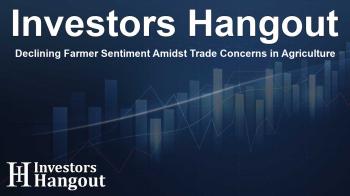Declining Farmer Sentiment Amidst Trade Concerns in Agriculture

Declining Farmer Sentiment Amidst Trade Concerns
The agricultural landscape is witnessing a decline in farmer sentiment, a trend that surfaced in June. This shift follows two months of positive expectation among farmers, as indicated by data from a prominent economic barometer. The Ag Economy Barometer witnessed a drop of twelve points, settling at 146. This change reflects producers' increasingly pessimistic outlook regarding future agricultural exports, which significantly influences their overall sentiment.
Current Conditions and Future Expectations
Farmers' perspectives shifted notably, with the Index of Future Expectations experiencing a sharp decrease, plunging eighteen points to 146. On the positive side, the Current Conditions Index only fell by two points, now at 144. Despite these recent declines, all three indices remain significantly higher compared to the same time last year, showcasing an underlying resilience in the sector.
Financial Projections and Investment Sentiments
The Farm Financial Performance Index also took a hit, losing five points and landing at 104. Producers' financial outlook deteriorated in June compared to May, yet an index above 100 signifies that farmers predict a more robust financial performance in the upcoming year. This optimism is largely attributed to favorable income projections in the livestock sector, particularly for beef producers.
Investment Opportunities and Machinery Purchases
Conversely, the Farm Capital Investment Index rose five points, reaching a score of 60, almost aligning with April’s figures. The increase in the investment index corresponds with a rise in the number of farmers believing it is an opportune time to invest, climbing from nineteen percent in May to twenty-four percent. However, the anticipated boost in farm machinery purchases may not materialize, as fifty-four percent of respondents plan to cut back on acquisitions compared to the previous year.
Farmland Value Expectations Dims
In June, the Short-Term Farmland Value Expectations Index experienced a decline of four points, standing at 120. While an index score above 100 suggests expectations of rising farmland values, the decrease in optimism is noteworthy. The percentage of producers expecting farmland values to increase fell from thirty-seven percent to thirty-two percent. Meanwhile, the sentiment for values holding steady has improved, with sixty-five percent of respondents indicating stability.
The Changing Landscape of Agricultural Exports
The evolving expectations concerning agricultural exports have been pivotal in reshaping farmer sentiment. A significant drop in the number of producers optimistic about increasing agricultural exports over the coming five years was recorded, falling to forty-one percent from fifty-two percent. In contrast, expectations regarding declining exports rose slightly, emphasizing a more cautious outlook among producers.
Perspectives on Trade Policies
The survey also explored farmers' views on free trade and its implications. Only thirty-one percent of farmers strongly agreed that free trade benefits agriculture and other American industries, a stark contrast to the forty-nine percent who held similar views five years ago. This decline in optimism reflects broader concerns regarding trade policies and their effects on agricultural profitability.
Impact of Tariffs on Farmer Income
Recent surveys reveal ongoing concerns among producers regarding U.S. tariff policies and their potential impact on farm income. Although worries persist, there is a noticeable decrease in the percentage of farmers expecting a significantly negative impact. In March and April, fifty-six percent anticipated adverse effects, which fell to forty-five percent in May and June, indicating a slight shift in sentiment.
Concluding Insights from Experts
Experts in agricultural economics emphasize the importance of these trends, citing a decline in optimism about future export prospects as a key factor behind the weakened sentiment among farmers. While apprehension around tariff policies continues, fewer producers now foresee severe consequences compared to earlier assessments this year.
Frequently Asked Questions
What caused the decline in farmer sentiment in June?
The drop in farmer sentiment was driven primarily by changing expectations regarding future agricultural exports and financial outlooks.
How do the current indices compare to previous years?
Despite the recent declines, current indices remain higher than those of the previous year, indicating some level of sustained optimism.
What are producers projecting for their financial performance?
Producers expect a slightly weaker financial performance compared to May, but the index remains above 100, suggesting overall optimism for 2025.
Are farmers planning to invest in machinery this year?
While some farmers feel it's a good time to invest, a majority plan to reduce their machinery purchases compared to last year.
What does the decline in optimism about exports indicate?
The decline in optimism about exports indicates increased concerns regarding trade policies and their potential effects on agricultural profitability.
About The Author
Contact Logan Wright privately here. Or send an email with ATTN: Logan Wright as the subject to contact@investorshangout.com.
About Investors Hangout
Investors Hangout is a leading online stock forum for financial discussion and learning, offering a wide range of free tools and resources. It draws in traders of all levels, who exchange market knowledge, investigate trading tactics, and keep an eye on industry developments in real time. Featuring financial articles, stock message boards, quotes, charts, company profiles, and live news updates. Through cooperative learning and a wealth of informational resources, it helps users from novices creating their first portfolios to experts honing their techniques. Join Investors Hangout today: https://investorshangout.com/
The content of this article is based on factual, publicly available information and does not represent legal, financial, or investment advice. Investors Hangout does not offer financial advice, and the author is not a licensed financial advisor. Consult a qualified advisor before making any financial or investment decisions based on this article. This article should not be considered advice to purchase, sell, or hold any securities or other investments. If any of the material provided here is inaccurate, please contact us for corrections.

